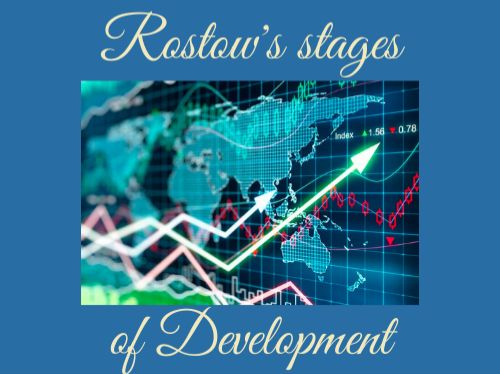How can a country achieve development? Rostow’s 5 stages
Jan 06, 2022 · 2 mins read
0
Share

In his 1960 book “The Stages of Economic Growth: A Non-Communist Manifesto,” W.W. Rostow listed out five stages a country must go through to achieve development: traditional society, preconditions for take-off, take-off, drive to maturity, and age of high mass consumption.
Save
Share
Each stage has economic, social, political, and cultural features which are unique to that stage and are formative in pushing the nation towards the next stage.
Save
Share
Traditional society. The economy is largely agrarian and depends on subsistence farming. A hierarchical social structure with low social mobility limits political power within the hands of the landowning class.
Save
Share
Preconditions for take-off. Surplus production and commercial agriculture stimulate urbanization and specialization. The expansion of trade and manufacturing leads to the rise of a commercial class. A centralized national government is formed to build necessary infrastructure.
Save
Share
Take-off. The manufacturing sector overtakes agriculture production during the most critical stage. Savings aid the investment of capital for profit. Economic modernization is reflected in the political sphere and an entrepreneurial culture promotes dynamic innovation.
Save
Share
Drive to maturity. Modern technology utilizes every resource, and the economy becomes less labor-intensive. Newer sectors based on technological advancement replace older ones. Political and social pressures lead to humane modifications to industrialization through reforms.
Save
Share
Age of high mass consumption. Resources and political support are used to achieve a balance between the three objectives that define developed nations: external influence, welfarism, and consumerism. The service sector and the manufacturing of durable goods dominate the economy.
Save
Share
Rostow’s work should be understood in the background it was written in - the Cold War - during which the US tried to prevent the expansion of communism into the decolonized “Third World.” American theorists like Rostow upheld the process of development through capitalism.
Save
Share
Thus, Rostow has been criticized for a Western-centric approach to development that decolonized nations were unable to replicate. But the success of Japan and the Asian Tigers gave some credence to Rostow’s theory.
Save
Share
Bottom line: Rostow’s economic growth and development model was witnessed in most Western nations. But have its five stages - traditional society, preconditions for take-off, take-off, drive to maturity, and age of high mass consumption - stood the test of time?
Save
Share
0